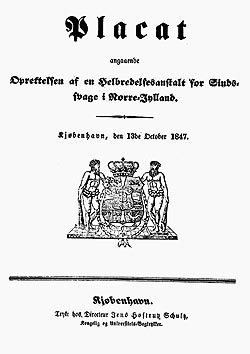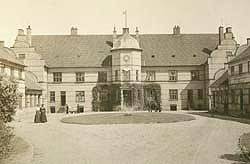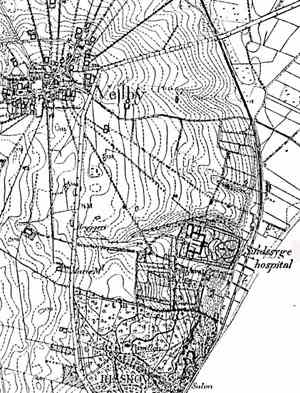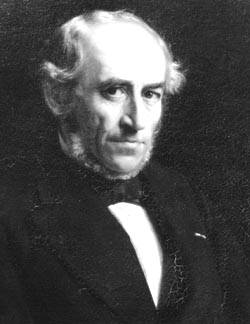
By a public notice of October 13, 1847
the king of Denmark confirmed that a
hospital was to be built on Vejlby Field
at Aarhus.It became The Curative
Institution forInsane in Northern
Jutland (the area north of the
Kongeaa), also called "
The Jutland Asylum".
J.C. Pritchard
As the first doctor ever the British psychiatrist J.C. Pritchard worked out the notion of moral insanity in his book from 1835. In 1842 this book was translated into Danish by Harald Selmer, the man behind The Jutland Asylum.

„The Jutland Asylum“, later known
as The Psychiatric Hospital in
Aarhus, was opened in 1852
with Harald Selmer as
consultant psychiatrist.
In Selmer's book from 1841 about St. Hans Hospital Selmer settled with the scientific foundation of the German psychiatry and showed how it lead to carelessness and had a negative effect on the morals of the patients. Instead he suggested moral re-education on the basis of Pritchard's methods.
The establishment of the psychiatric hospital in Risskov
At the request of the medical society Philiatrien Harald Selmer published his paper "General principles of the organization of the psychiatric system" in 1846. The paper got public attention and came out at the same time as the Jutlandic Assembly of the Estates of the Realm were reading a bill for improving the psychiatric system. Selmer's book formed the basis of The Curative Institution for Insane in Northern Jutland, also called "The Jutland Asylum", which opened in 1852 with Selmer as consultant psychiatrist.
Characterized by the romantic concepts of the time the hospital was built by forest (Risskov) and bay, separated from the harmful influences of the city of Aarhus (about 10.000 inhabitants at that time).
The exemplary hospital at Aarhus
Harald Selmer is considered to be the founder of modern Danish psychiatry. The hospital at Aarhus was founded in 1852 on the basis of his ideas and it was the first well-regulated psychiatric treatment hospital in Denmark.
After all, the curative optimism was too high and in 1861 The Jutland Asylum was enlarged with a bigger care ward for the incurable. The incurable patients could spend years or maybe even the rest of their lives in a secluded and regulated environment. However, lack of accommodation were soon to counteract the good intentions.
Harald Selmer
Harald Selmer (1814-1879)
Born on March 18, 1814 in Vejle, died on December 17, 1879 in Frederiksberg. Son of Johan Henrik Selmer and Inge Marie Moeller.
1827-31 Horsens Grammer School and private lessons by an older brother.
1831-38 Medical studies, finished with highest mark.
1839-41 House physician at St. Hans Hospital in Roskilde under the supervision of consultant A.W. Th. Goericke.
1841 Physician at The Konradsminde Glassworks near Hobro.
1841 Published a book on St. Hans Hospital in Roskilde
1846 Published the paper "General principles of the organization of the psychiatric system"
1852-78 Consultant psychiatrist at The Curative Institution for Insane in Northern Jutland, Risskov.
Selmer's view on mental illnesses
As a somatic, Selmer saw mental illness as determined by bodily factors, and he emphasized it as a disease that required treatment. This disease could manifest itself as a "disease in the soul", but only particular predispositions could cause a person to become too frail to withstand the challenges and troubles of life.
Abdominal diseases, indigestion and high fever could cause disorders of the brain. As a Christian, Selmer could not accept the idea that the immortal soul itself was the cause of illness.
Selmer's view on psychiatric hospitals
Because of the limited cures and medicine of the time the arrangement of a mental hospital and the daily care of the patients were considered of great disciplinary importance. Selmer believed in a moral order in everyday life, just as he concentrated on work therapy for the able-bodied.
Selmer believed that the hospitalization released the insane from the conditions and/or the persons at home which had advanced the mental illness.

Kortet viser hospitaletes placering ved Vejlby Krat,
på Vejlbys udstykkede jorder.
Jernbanen er tegnet ind senere (1877)




